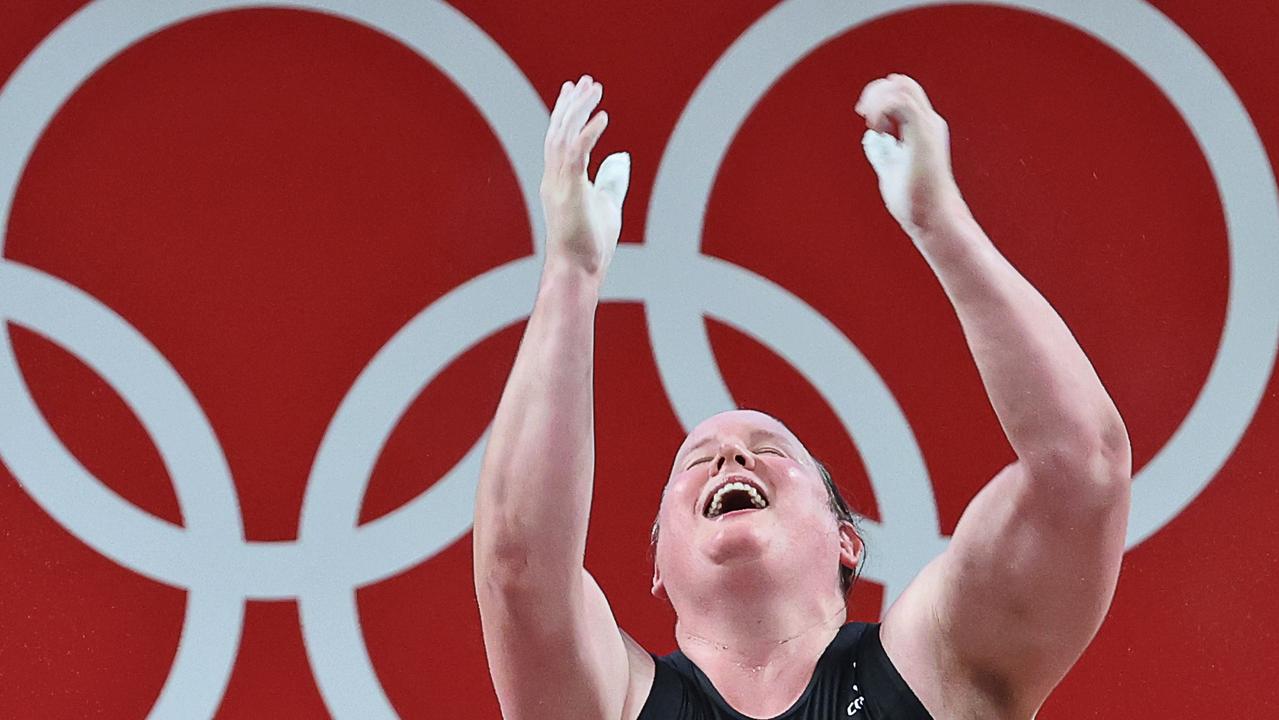Two words you’re not allowed to say about transgender weightlifter Laurel Hubbard

The complexities around Laurel Hubbard’s historic appearance in Tokyo were laid bare well before she stepped up to the stage for the first time.
The Kiwi weightlifter made history on Monday night, becoming the first transgender athlete to compete at an Olympics. The decision to allow her to compete among women – because she has testosterone levels below the threshold required by the International Olympic Committee – has sparked plenty of debate.
Some, like sports writer Ewan Mackenna, believe the 43-year-old Hubbard’s appearance, having transitioned to a female in her 30s, is a “massive slap to the face of all women and fair sport, and an indictment of the Olympics and New Zealand sport”. Former Olympian Caitlyn Jenner believes it’s “not fair”, while so too does tennis legend Martina Navratilova.
Others believe denying Hubbard the chance to compete is discrimination. They say she’s done nothing wrong, so why should she be excluded?
Whatever side of the fence you sit on, there was no qestioning the huge level of interest in her showing at the Tokyo International Forum – a huge convention centre in a shiny high-end shopping district of the Japanese capital.
Spectators are banned from the Games because of Covid-19 but there were hundreds of people in attendance as officials, a huge pack of global media and athletes’ team members gathered to watch history be made. Of all the events this reporter has seen in Tokyo over the past week-and-a-half, the crowd here was the largest of any by a country mile. And then some.
Before competition got underway on Monday night, journalists at the venue were given a 20-page guide on how to report appropriately on transgender athletes. Among the guidelines was an instruction not to use the two-word phrase “born male” to describe Hubbard because: “No one is born with a gender identity. Everyone is born a baby and their gender is assigned to them by doctors and family members based on physical sex characteristics that may not correspond to their gender identity as it develops over time.”
There were also instructions not to report trans athletes as having an unfair advantage over their rivals. According to the booklet, that’s “misinformation”.
A list of LGBTQ+ “athletes to watch” was also provided, as was a rundown of the history of LGBTQ+ athletes at the Games, in addition to definitions of terms such as “nonbinary”, “gender identity” and “cisgender”.
It seemed more than just coincidence when Jon Bon Jovi’s It’s My Life blared over the loudspeakers before the first lift. “It’s my life, it’s now or never. I ain’t gonna live forever. I just want to live my life while I’m alive. It’s my life!”
Poignant lyrics for a poignant occasion.
Hubbard gave a short wave to the crowd when all 10 competitors were introduced at once. There was warm applause, but not the same rousing ovation reserved for other athletes.
It was a similar story when the Kiwi star came out for her first lift – a 120kg effort she failed to clear. “Go on!” yelled a voice from the seats. “Go Laurel!” shouted another.
In the end Hubbard’s history-making appearance was an anticlimax. She failed all three of her lifts in the snatch component of the event – the first at 120kg and two at 125kg – to become the first competitor knocked out, not even making it to the second clean-and-jerk phase.
All those critics concerned Hubbard would have an unfair advantage over everyone else could sleep easy. It proved to be nothing of the sort. She later jokingly referred to her Olympic flop as a “non-performance”.
READ MORE: Aussie’s bike falls apart mid-race
A huge throng of reporters rushed to catch a glimpse of Hubbard behind the scenes after her early exit, hoping the media-shy star would front reporters. Journalists ran and pushed past one another to hear Hubbard speak.
They didn’t need to rush. About 20 minutes later, Hubbard fronted approximately 40 reporters, giving a short statement but not taking any questions.
She was humble, polite, emotional and above all, genuine as she thanked everyone – including the International Olympic Committee and New Zealand Olympic Committee – who made it possible for her to compete in Tokyo.
“They (the IOC) have reaffirmed their commitment to the principles of Olympism. They‘ve demonstrated that sport is something for all people around the world to do. It’s inclusive, it’s accessible and I think that’s just really fabulous,” Hubbard said.
“The NZOC have supported me through what have been quite difficult times. I know my participation at these Games has not been entirely without controversy but they have been just so wonderful.”
The haters won’t go away but Hubbard, after all she’s been through, was just happy to be here.